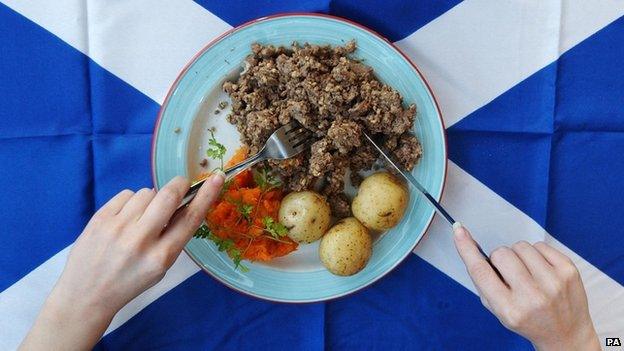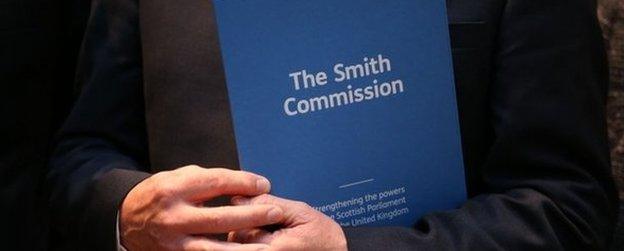Important diary dates to savour
- Published

A taste of politics is being added to Scottish celebrations for historic Scottish events
It is the time of year, is it not, for staging points in the calendar. Christmas and Hogmanay. Before that, St Andrew's Night. And, later this month, Burns Night.
Those latter two gained added significance this season. They were selected, with due symbolism, as the target dates for the publication of the Smith Commission report, external and, subsequently, attendant draft clauses.
Lord Smith met the first target, with a day or two to spare. The UK government intends to do the same with the publication next week of the clauses for a potential Bill.
Specifically, the Bill is the work of the Scotland Office - although it is fair to say that the Cabinet Office and the Treasury have occupied decidedly more than observer status in preparing said clauses, just as they did during the Smith Commission deliberations.
But, once the Bill is out in the open, is that it? Is everything effectively on hold until after the UK General Election in May?
At Westminster, yes. At Holyrood? Only up to a point.
Perhaps I should recap a little before proceeding.
Right at the end of the referendum campaign, Gordon Brown sought to strengthen the salience of the No campaign offer by persuading pro-Union party leaders to add a little more detail to their stated intention of providing Holyrood with more powers. That revised offer included those two target dates, 30 November 2014 and 25 January 2015.
The Smith Commission was duly convened and produced a plan, featuring the devolution of all income tax bands and rates as its big idea. The current endeavour is to turn that package into clauses which, it is intended, would form proposed legislation after the May election.

Some Smith Commission highlights

Income tax will remain a shared tax and both the UK and Scottish Parliaments will share control of income tax.
The receipts raised in Scotland by the first 10 percentage points of the standard rate of VAT will be assigned to the Scottish government's budget.
The power to charge tax on air passengers leaving Scottish airports will be devolved to Holyrood.
All aspects of National Insurance Contributions, Inheritance Tax and Capital Gains Tax, Corporation Tax, Fuel Duty and Excise Duties will remain at Westminster.
Additional borrowing powers to be provided.
Control over state pension to remain with the UK parliament.
Universal Credit (UC) to remain with the UK parliament.
Some benefits, including to carers, disabled and ill people, will be administered by Holyrood.
The Scottish Parliament will have new powers to create new benefits in areas of devolved responsibility

Entirely understandably, the political focus at Westminster has shifted to the campaign for those elections. (I say "shifted". In truth, it never strayed very far from that central point, given that the date of the election is fixed and known.)
I am not, repeat not, saying that Smith is being neglected. To the contrary, the task of producing those draft clauses is exercising some serious and sustained brain power. Whitehall knows it is potentially revising a core element of the UK constitution. It would be handy to get it right.
However, the political tone in the New Year has modified somewhat for those who ply their trade in the Commons. They are thinking of how to persuade the people to vote for them - once more or afresh. Which, in these multi-party days, can generate anxious moments.
Smith is something - a big something - to revisit, once the election is done. At Westminster, there will, in practice, be little if anything done with the draft clauses once they are published. That is not a point of criticism. It is a function of the electoral calendar.
At Holyrood, however, that need not be the case. MSPs will continue to sit for an unprecedented fifth year (to avoid a clash with the known Westminster election date.) Holyrood's denizens will not face the electorate until 2016.
So what in the meantime should they do with the Smith clauses? Simply sit back and wait for the Westminster election to conclude? I think not.
May election
I believe it likely that the committee at Holyrood which has been studying constitutional matters (the referendum, the franchise etc) will now turn its attention to the Smith clauses.
That committee is already expected to produce a paper offering its opinion on the Smith report. That will emerge before the UK election in May. You might call that the political verdict.
At the same time, it is open to the MSPs on the committee to consider the technical and detailed consequences of the Smith plans.
At the very least, MSPs can summon expert witnesses - for example, in taxation and benefits - to gather evidence as to the efficacy or otherwise of the Smith formula as expressed in draft legislation.
That would enable Holyrood to prepare material to present to MPs when discussion of the Smith clauses resumes after May's election.
Remember that, if there is to be a further change in Scottish Parliamentary powers, it will be legislated at Westminster - but with Holyrood consent, as in the past. The renewed scrutiny would inform that process of seeking consent.